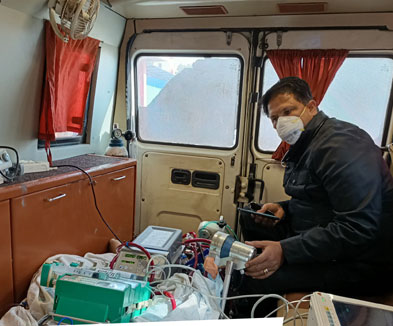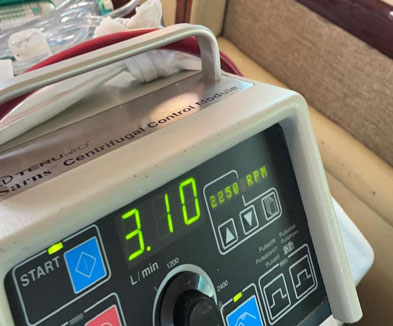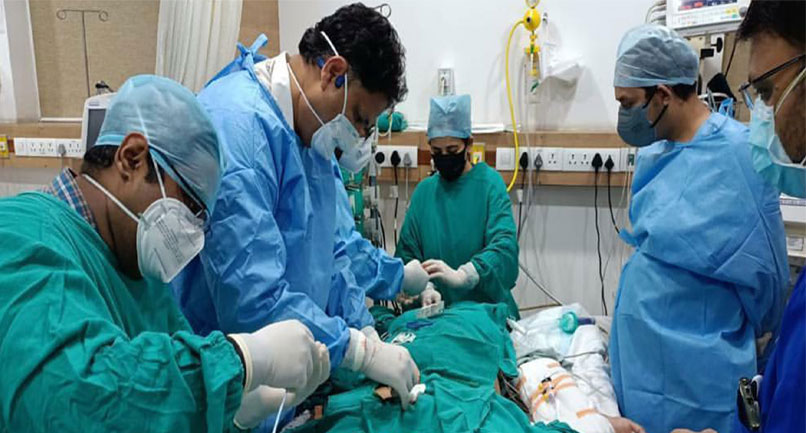What is ECMO in Medical
ECMO (Extracorporeal Membrane Oxygenation) was primarily used in children a few years ago, but in recent times, it has played a significant role in the management of respiratory and cardiac diseases, especially during the COVID-19 pandemic when lung damage is a common occurrence and ventilators may fail to provide adequate oxygenation. ECMO is a highly specialized procedure that requires a skilled team and coordinated effort.
Before deciding to initiate ECMO treatment for a patient, it is crucial to consider the endpoint and ask relevant questions to the doctors recommending it. ECMO carries a substantial cost and involves complex outcomes, so it is important to engage in a thorough discussion and have a clear understanding of the goals and limitations of ECMO.
Families of patients should be thoroughly counseled about ECMO, as making a well-thought-out decision based on medical considerations rather than solely on emotions tends to yield the best results. While it is incredibly challenging to witness our loved ones suffer during a pandemic, it is important to understand that ECMO serves as a bridge between lung damage and the possibility of a lung transplant, but it does not completely reverse the lung destruction caused by COVID-19.
Why Is ECMO Used During Patient Transportation By Air?
ECMO (Extracorporeal Membrane Oxygenation) may be utilized during patient transportation by air for several reasons:
- Critical Condition: Patients who require ECMO support are typically in a critical condition with severe respiratory or cardiac failure. ECMO provides temporary life support by bypassing the lungs or heart, oxygenating the blood, and removing carbon dioxide. By utilizing ECMO during air transport, patients can receive continuous support and stabilization, increasing their chances of survival during the journey.
- Limited Access to Specialized Care: In some cases, the patient's condition may require transfer to a specialized medical facility that offers advanced treatment options such as organ transplantation or specialized cardiac procedures. Air transportation with ECMO support allows patients to be safely transferred to these specialized centers, even if they are located far away or in remote areas where ground transportation options may be limited.
- Time-Critical Interventions: Certain medical conditions, such as severe respiratory distress syndrome or cardiogenic shock, may require time-sensitive interventions that are only available at specific medical centers. Using ECMO during air transport ensures that patients can be swiftly transported to these facilities, where the appropriate interventions can be performed without delay.
- Long-Distance Transfers: When the distance between the referring and receiving medical facilities is significant, air transportation with ECMO support can significantly reduce travel time. This is particularly important for critically ill patients who may deteriorate during prolonged transfers. By providing ECMO support during air transport, patients receive continuous life-sustaining care while minimizing the duration of the transfer.
It's important to note that the decision to use ECMO during patient transportation by air is made on a case-by-case basis. The feasibility and appropriateness of ECMO support during air transport depend on various factors, including the patient's condition, stability, and the availability of ECMO expertise and equipment in the air ambulance.
Why Is ECMO Used During Patient Transportation By Air?
Transporting patients with Extracorporeal Membrane Oxygenation (ECMO) via flight ambulance and helicopter ambulance is a crucial and life-saving medical procedure for individuals suffering from severe pulmonary diseases, cardiac failure, or respiratory failure. ECMO has demonstrated its effectiveness in treating respiratory failure caused by trauma, post-surgical complications, and other related conditions. Air ambulance services offer highly efficient patient transportation, equipped with ECMO facilities, both domestically and internationally, along with comprehensive Neonatal Intensive Care Unit (NICU) services.
During ECMO transfer, the patient is carefully monitored and managed by a specialized team of healthcare professionals, including ECMO specialists, nurses, and respiratory therapists. The transfer may take place within a hospital, between hospitals, or even across different cities or countries.
The process involves several critical steps to ensure the patient's safety and the proper functioning of the ECMO system. This includes assessing the patient's stability for transfer, ensuring the availability of appropriate equipment and
supplies, coordinating with the receiving facility, and preparing the transport environment, such as the ambulance or aircraft.
The ECMO team carefully manages the patient's medications, blood gases, and vital signs throughout the transfer. They also remain vigilant for any potential complications or emergencies that may arise during the journey. ECMO transfer requires a high level of expertise, coordination, and specialized equipment to ensure the patient's well-being during transport. It is typically reserved for critically ill patients who require advanced life support and cannot be safely transported by conventional means. The goal of ECMO transfer is to provide seamless continuity of care and improve the patient's chances of recovery by accessing specialized medical facilities or expertise in a different location.
Emsos Aviation provides both International Air Ambulance Services and domestic repatriation services to individuals requiring immediate evacuation. ECMO, which was originally developed in the United States, has now become a central and crucial component of critical care in all developed nations. Some advanced tertiary hospitals in India are progressively integrating ECMO into their medical practices.


